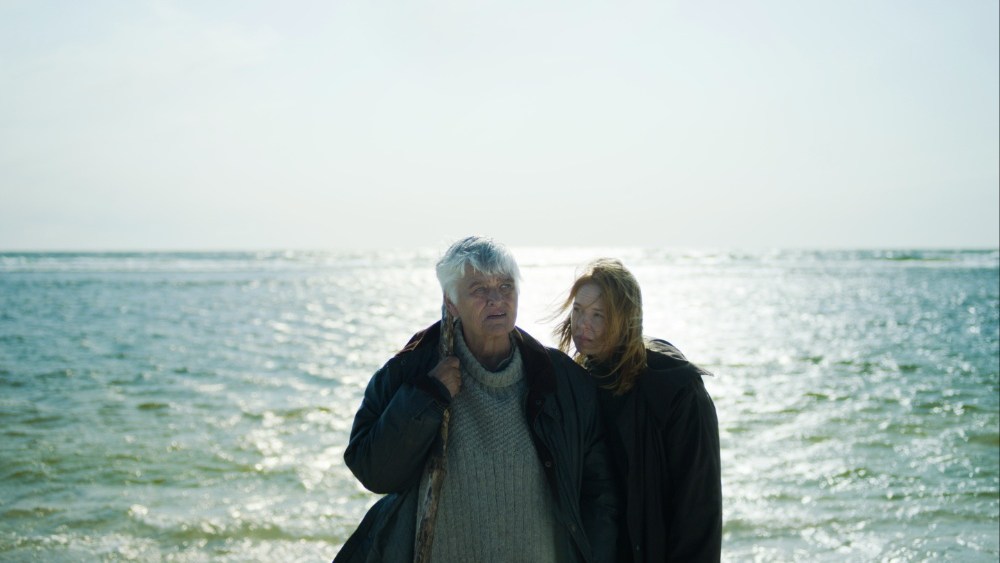‘Fallen Leaves’ Star Alma Poysti, Pirjo Honkasalo Talk ‘Orenda’
Golden Globe nominee Alma Pöysti, known for “Fallen Leaves,” is now leading “Orenda.”
The film, which premieres at Rotterdam and Göteborg festivals, is directed by Finnish director Pirjo Honkasalo (“Concrete Night”) and written by Pirkko Saisio. It sees Nora (Pöysti), a famous opera singer, escaping to a remote archipelago following the suicide of her husband. “Welcomed” only by prickly priest Natalia (Saisio), the two women immediately butt heads.
The film is produced by Bufo, while the Yellow Affair handles sales.
“They recognize themselves in each other, and they can’t stand it. They’re two forces locked in a battle and when they choose not to speak, it’s extremely powerful. It’s a very Finnish weapon, to use silence this way,” Pöysti tells Variety. Slowly, the frenemies start to heal each other’s wounds.
“I found it enjoyable, the way they challenge each other,” Honkasalo adds.
“When I look back, I realize I’ve often dealt with guilt in my films. The kind that’s passed from generation to generation. You can’t really get rid of it, but you can find mercy and one day, guilt suddenly disappears. You can hate your mother and then you don’t feel it anymore. The cruelty of life is that there’s no one recipe for achieving that state.”
Surrounded by nothing but nature, Nora and Natalia are confronted with beauty on a daily basis. But “sunsets are a trap,” Pöysti says with a laugh. Honkasalo adds: “We hate them. When you are shooting in an archipelago, everyone goes for the sunsets. The light is so beautiful. I always say that if there’s a sunset in a film, it will win you a ecumenical prize. I have nothing against beauty, but it has to express something.”
Still, the archipelago is a big part of who she is. Same goes for her star.
“This was shot in Finland and in Estonia, and in Finland, we have almost 60,000 islands and it’s a ‘land of a thousand lakes.’ We have two kinds of people there: the lake people and the island people. We are the island people,” the director says.
In “Orenda” – which translates to ‘great spirit’ or ‘divine essence’ – both protagonists look for the sacred. But their relationship with God is “broken,” Pöysti says.
“They carry huge guilt and look for bigger meaning. I guess that Nora, when she approaches this priest, wants someone to tell her how to do it. And then she’s disappointed, because she has to put in the work herself. You need to befriend your pain and your past. Either you survive it, or you go down with it.”
According to Honkasalo, “religion can be a dangerous topic.”
“I think it was Pasolini who said that Western people have a castrated soul. Talking about the soul is more rebellious than talking about Marxist revolution. For me, and for Pirkko, you just can’t ignore the holiness of a human being. It’s not easy to talk about it, but that’s the beauty of film, of music. You can sense the sacredness of life in art,” she says.
“Think about Bob Dylan. When he became a Christian, he made [1980 album] ‘Saved.’ I was driving in France, put the cassette on, and, as a hardcore left-winger, immediately threw it out of the window. Later, I went to the Soviet Union to a Russian Orthodox convent to make a film [“Mysterion”]. Finland is a small country: everyone knows everybody. There was a rumor that ‘Pirjo went crazy.’ They said: ‘She’s already gone to a convent. She’ll go to mental institution next,’” she laughs.
In the film, music serves as a “channel to the spirit [realm],” Pöysti notes.
“It connects you to something bigger. A singer can be a vessel, so can an actor or a priest. If your voice is damaged, you lose your entire purpose. Both their compasses are a bit off.”
“There was a book that really inspired Pirkko, it talked about Eros and the sacred, and violence. They always co-exist. And music… music deals with all of it,” Honkasalo adds.
“We had a crazy case in Finland once. There was this orchestra playing Handel’s ‘Messiah’ in schools. The mother of one of the students complained her son was ‘exposed to religion.’ The city [of Hämeenlinna] was ordered to pay her €1,500 in damages. Still, it’s different when we talk about religion and when we talk about spirituality. Religion is an organized way to serve. And that sense of holiness? It’s already deep within us.”


